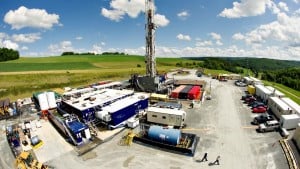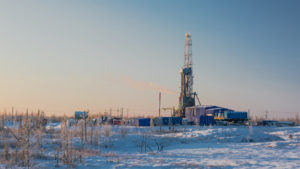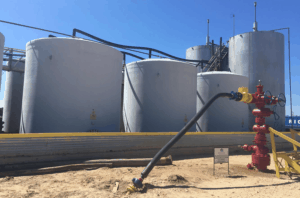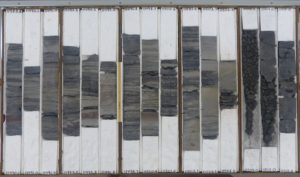You may take any combination of courses for $499 each, or register for all four and save!
(Discount applied at checkout.)

Petroleum Geology
This course is designed to provide a broad overview of the historical, economic, and scientific context of modern energy exploration and production. It looks at global economic interdependencies in the energy sector, and explains the science of petroleum geology.

Petroleum Engineering & Technology
This course introduces the technologies that make drilling and completions possible, typical operational methods for drilling and completing wells, and methods for solving problems that come up during the drilling process.

Environmental Stewardship
This course covers the intersection between the oil and gas industry and the wider environment. It starts with an overview of the global water cycle and the energy-water nexus before closely examining the other concerns. The course ends with an overview of sustainable development as a best practice in all industrial environments.

Injection Wells and Sustainable Energy Systems
Covering emerging technical and industrial concerns, this course provides an overview of underground injection, carbon capture utilization and storage, induced seismicity, and subsurface containment.

Effective Communications
These communication lessons provide knowledge and training on rhetorical strategies, knowing yourself and social networks, and how to overcome difficult situations.

PGE 379/383: Applied Subsurface Geology
This mini-course is composed of selected topics from the Top Energy Training Course as supplemental material for Dr. Hilary Olson's PGE 379/383: Applied Subsurface Geology.
Petroleum Geology: Petroleum Systems Lesson
The first stage of oil and gas development is known as exploration. During this phase, geologists are trying to figure out where to drill for new reserves of oil and gas, or how to expand an existing oil or gas field. What petroleum geologists are really looking for are complete petroleum systems.
Petroleum Geology: Hydrocarbons and Petroleum Geology Lesson
The Earth is a dynamic system, millions of years old, whose surface is always changing and upon which organisms of untold multitudes have lived and died. The effects of weather, erosion, climatic changes, and tectonic movement, among many factors, have produced the world on which we all live today.
Petroleum Geology: History of Extraction Lesson
Humans have been using natural products for heat and light for millennia. They started with resources that were easy to find and collect, like dung and wood, and gradually worked up to much more energy-dense resources like tight oil and shale gas that require great expense and time to acquire.
Petroleum Geology: The Global Energy Marketplace Lesson
How do oil and gas influence world politics and economies? Where are these hydrocarbons being produced and used? Why is energy so important to everyone? In this lesson, we will explore these questions and more to assure that you have an understanding of the global energy picture.
Petroleum Engineering & Technology: Anatomy of a Drill Site Lesson
We’re going to start by setting up the pad and rigging up the derrick and drilling systems. We’ll talk about how all the parts of the systems work, and why operators use the equipment they do today.
Petroleum Engineering & Technology: Formation Evaluation Lesson
The purpose of formation evaluation is to quantify the production potential of a well. Operators want to know the size of the reservoir, the quantity of hydrocarbons in place, and the ability of the reservoir to produce hydrocarbons.
Petroleum Engineering & Technology: Stimulation Lesson
Stimulating a well means to open up pathways around the wellbore to increase hydrocarbon fluid flow. This lesson will walk through the process of hydraulic fracturing and take a look at acidizing, two methods of stimulating a well.
Environmental Stewardship: Environmental and Regulatory Considerations
This lesson focuses on non-water environmental factors including best management practices for construction of production sites and pipelines, surface reclamation, the impact and regulation of oil spills, solids disposal and monitoring, fugitive emissions and gas flaring, soil and air impacts, and the potential risks of naturally occurring radioactive material.
Environmental Stewardship: The Global Water Cycle Lesson
The Global Water Cycle covers a wide range of topics such as, surface water and watersheds, groundwater reservoirs, sources of household water, private wells, well maintenance, natural contamination, methane migration, water sampling, water testing and baselines, water quality, and trends in water consumption.
Effective Communications: Knowing Yourself and Social Networks Lesson
Outside of the basic rhetorical strategies, good communication also depends on introspection and self-awareness. One’s communication style is a reflection of oneself. Personality traits, cognitive biases and relationships with others all influence that style.
Effective Communications: Rhetorical Strategies Lesson
An understanding of the fundamentals of rhetoric (1) improves our skills to communicate any message more effectively and (2) provides us with an ability to dissect and analyze the many messages all around us.
Effective Communications: Difficult Situations Lesson
No amount of careful planning and knowledge can completely eliminate the possibility of miscommunication and conflict. In difficult situations, it is best to take immediate steps to mitigate social fallout, resolve conflicts and repair relationships.
Injection Wells and Sustainable Energy Systems: Underground Injection Lesson
Underground Injection provides a brief overview of regulatory issues, including primacy, describes the different classes of injection wells, and discusses the importance of particular classes to oil and gas operations and geothermal energy.

